Admitting weakness is not a weakness
08 October, 2019 Reading: 3:28 mins
KISS junior strategic planner James, who recently completed an MSC in Brand Leadership at the University of East Anglia, shares his thoughts on one aspect which caught his attention when researching consumer purchasing behaviour and decision making around premium brands

I recently had the pleasure of reading Richard Shotton’s The Choice Factory, in which he outlines 25 behavioural biases that influence what we buy. As a junior planner myself, I would thoroughly recommend reading this book – it gives you practical advice on how to apply behavioural science in your work and is full of great anecdotes and case studies.
Of all the behavioural biases he describes, the one I found most interesting is a phenomenon called ‘the pratfall effect’. Although I’d never heard of this, it’s nothing new and was originally described in 1966 by Elliot Aronson. Aronson recorded an actor answering a series of quiz questions. The actor answered 92% of the questions correctly but, after the quiz, the actor pretends to spill a cup of coffee over himself. The recording was shown to two groups of students: one of the recordings contained the spillage and one didn’t. Interestingly the students found the clumsy contestant was significantly more likeable.
Aronson found that human beings prefer people who exhibit a weakness – hence ‘the pratfall effect’. Ogilvy chairman Rory Sutherland suggests that it’s not surprising to discover that there is an evolutionary instinct which causes us to prefer a more authentic person over someone who implausibly pretends to be flawless. And he argues that the same can be said for brands.
The pratfall effect is increasingly present in our decision-making process when it comes to considering various products and brands. This is highlighted again in a study by Zenith Optimedia who replicated the work of consumer psycolologist Adam Ferrier. 626 people were asked to state a preference from two biscuits which were the same bar one small difference: one had a rough edge; the other a perfectly smooth one. The biscuit with the rough edge, was the overwhelming favourite – the small imperfection didn’t detract from its appeal but actually boosted it.
In a world where consumers are increasingly cynical of brands and suspicious of over-hyped promises, admitting weakness can help make a brand seem more human. Shotton believes that if a brand is open about admitting weakness this could be perceived as a tangible demonstration of honesty and, therefore, makes other claims more believable. Some great examples of how brands have capitalised on this effect include the ‘reassuringly expensive’ tagline from Stella Artois and VW Beetle’s ‘Ugly Is Only Skin-Deep’ campaign.
Current trends in branding point to ;’the pratfall effect’ now being present in a brand’s DNA – which explains the success of the likes of Ryanair, who openly admit that the trade-off for cheap prices is a compromised service, no reservations and a small luggage allowance. If they hadn’t admitted as much, customers may have assumed the cost-cutting had come at the expense of safety.
For soft drinks brand Ugly Drinks, ‘the pratfall effect’ is present in everything they do. They call themselves Ugly because they stand for exposing the ‘Ugly truth’, explaining that ‘too many products promise health and happiness, but we won’t promise you the world, we’re just a drink! If that’s Ugly, then that’s fine’. Their core strength stems from the fact that they admit they’re not perfect and nor is the world around them, and perhaps the sooner more brands can accept this truth the sooner consumer trust will come back into marketing.
At KISS we believe that exhibiting a weakness doesn’t always mean you are weak. We value honesty, integrity and helping our clients deliver on the promises they make to their customers. We help to develop strategies that are genuine and distinctive – ‘the pratfall effect ‘highlights how simplicity and self-confidence can help a brand stand out from their competitors. If you need help with brand strategy or articulation, or want to develop a campaign that will get people talking, then give us a call.

